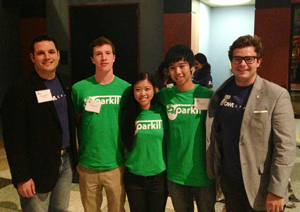Before a full house of more than 300 people, Rice engineering major Jennifer Ding pitched the virtues of ParkiT, an OwlSpark startup company that uses image analysis technology to allow parking garage businesses to manage their spaces quickly and efficiently.

Celebrating the inaugural OwlSpark Pitch Day are, from left, Darren Clifford, managing director of OwlSpark; ParkiT founders Josh Crozier, Jennifer Ding and Xin Huang; and Thierry Rignol '12, OwlSpark intern.
Apparently she convinced at least one person in the OwlSpark Pitch Day audience.in Duncan Hall’s McMurtry Auditorium. In his remarks after the nine OwlSpark companies presented their business plans, Rice President David Leebron said, “I’m sold on anything that helps with the parking situation. This budding company is an example of Rice University as the ‘Entrepreneurship University.'”
Aug. 15 was Pitch Day for the first class of OwlSpark companies, and it was attended by potential investors, venture capitalists, “angel investors,” Rice faculty, staff and students, and business leaders from Greater Houston. OwlSpark is the startup accelerator founded earlier this year by two Rice engineering undergraduates, a humanities undergraduate and an MBA candidate. For 90 days it provides teams with the funding ($1,000 per founding member per month), space, industrial and academic mentorship and networking opportunities required to launch their companies.
“We think of it as an intensive boot camp for young entrepreneurs,” said Darren Clifford, OwlSpark’s co-founder and managing director. Of the 37 entrepreneurs who make up the nine teams, 15 are Rice undergraduates, seven are graduate students, 11 are Rice alumni, three are not associated with the university and one is a faculty member. Twenty-six are male, and 11 are female.
“We also have 120 volunteer mentors who have worked closely with our companies. The 55,000 Rice alumni have greeted us with open arms,” Clifford said.
ParkIt was developed by Ding and three other engineering undergraduates; they devised an image-analysis algorithm for use in parking garages that enables operators to monitor in real time which parking spaces are occupied and vacant. The company is negotiating with the central parking garage at Rice and with the company that manages parking garages for the city of Houston in the Theater District.
“ParkiT automates each step of the parking process and collects data to help operators manage their facility,” Ding said. “Eventually, through a mobile app, drivers will be navigated to the best empty parking spots.” Ding’s team took second place last spring in the annual Rice Undergraduate Venture Challenge.
Another team, Sweatalyzer, has developed a wearable, disposable, noninvasive patch the size of a Band-Aid that measures blood alcohol content through human sweat. The patch changes color as it detects increasing alcohol consumption. Jay Dhuldhoya, a graduate student in bioengineering and CEO of Sweatalyzer, said the company will market the product initially to universities and has already had preliminary meetings with John Hutchinson, the dean of undergraduates at Rice.
Another team founded by Rice engineering undergraduates is Village Technologies, the only not-for-profit company among the inaugural nine. Andrew Amis, a senior majoring in chemical and biomolecular engineering, explained that his group is already providing basic engineering curriculum and logistics for 10 schools in Uganda, Tanzania and Kenya.
“We have people in Africa building wind turbines, water purifiers, solar cookers and refrigerators that don’t require electricity. We are sparking innovation among young people,” said Amis, who recently returned from a three-week visit to Africa.
The other OwlSpark startup companies are:
CheckedTwice: an online gift registry for family holidays and birthdays.
Coached Schooling: an educational services provider that fosters a network of small, low-cost K-12 private schools, called coaching practices, through the use of Web-based technologies.
Concept Node: a service that uses data analysis to help companies build more effective employee teams.
The Emergency Core: a shipping pallet that can be, after delivery to refugee camps and other emergency facilities, reassembled into mobile flooring.
Medical Informatics: creator of a software platform, Sickbay, that processes real-time, integrated medical data to provide clinical decision support. It’s already being piloted at Texas Children’s Hospital.
OwlEngine: a prediction engine designed to provide companies and consumers with future stock prices with an 85 percent confidence interval.
In his closing remarks, Leebron said, “It’s too soon to say whether every company here will be a success, but I think we can say this experience will make their next venture a success.”
With support from Rice University, the Rice Alliance for Technology and Entrepreneurship, the Laura and John Arnold Foundation, the Rice Center for Engineering Leadership and the Benificus Foundation, OwlSpark has raised almost $300,000 for its operating budget.
–Patrick Kurp is a writer in the George R. Brown School of Engineering.


Leave a Reply